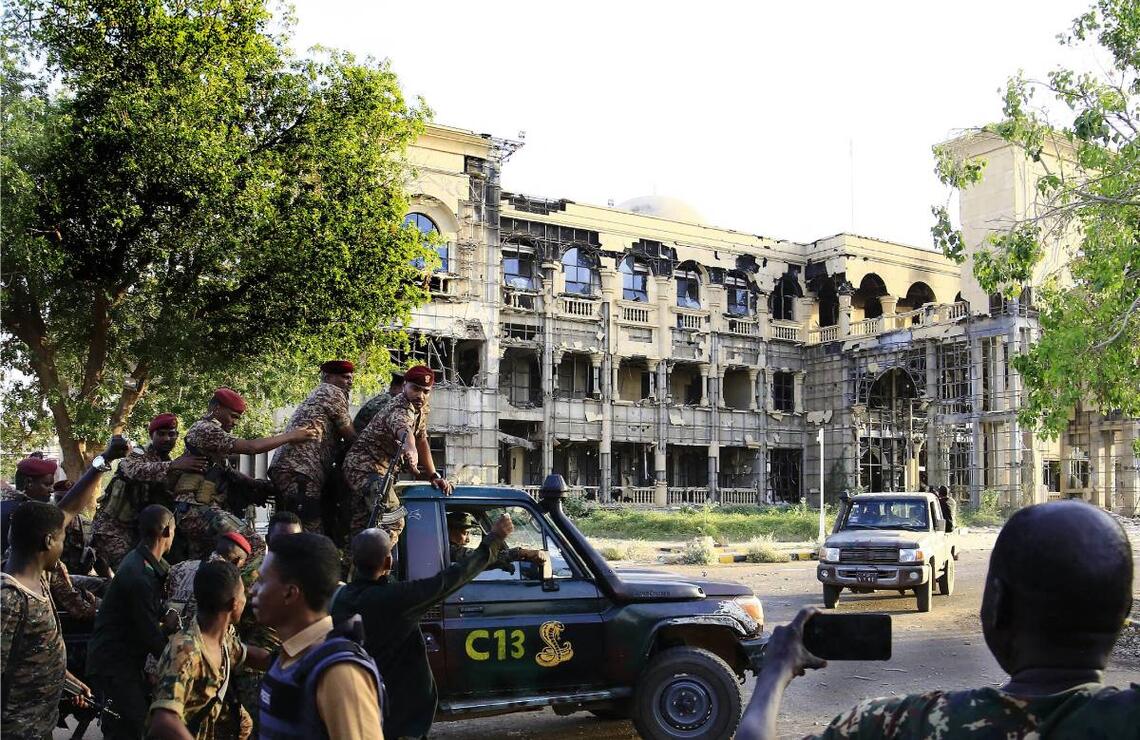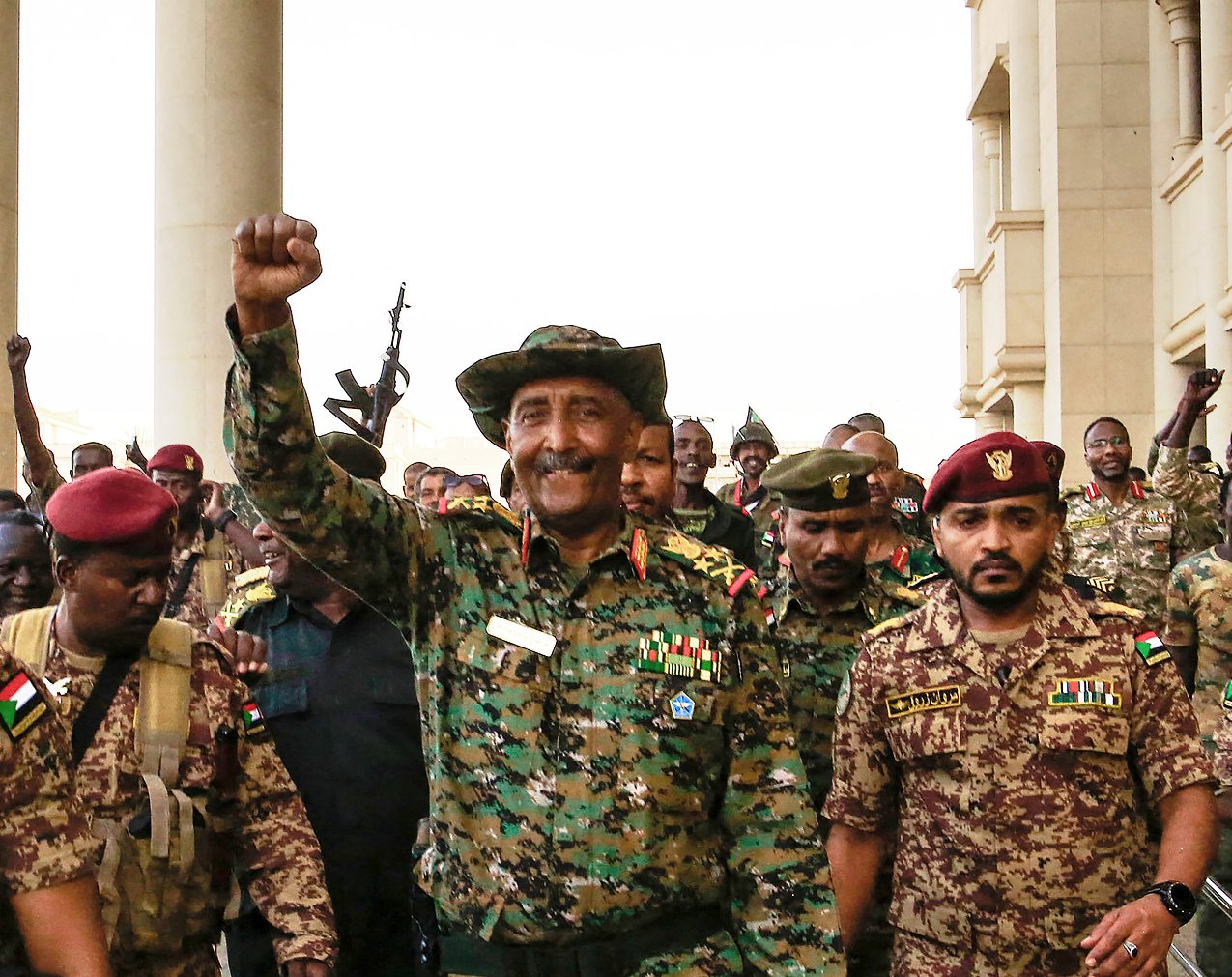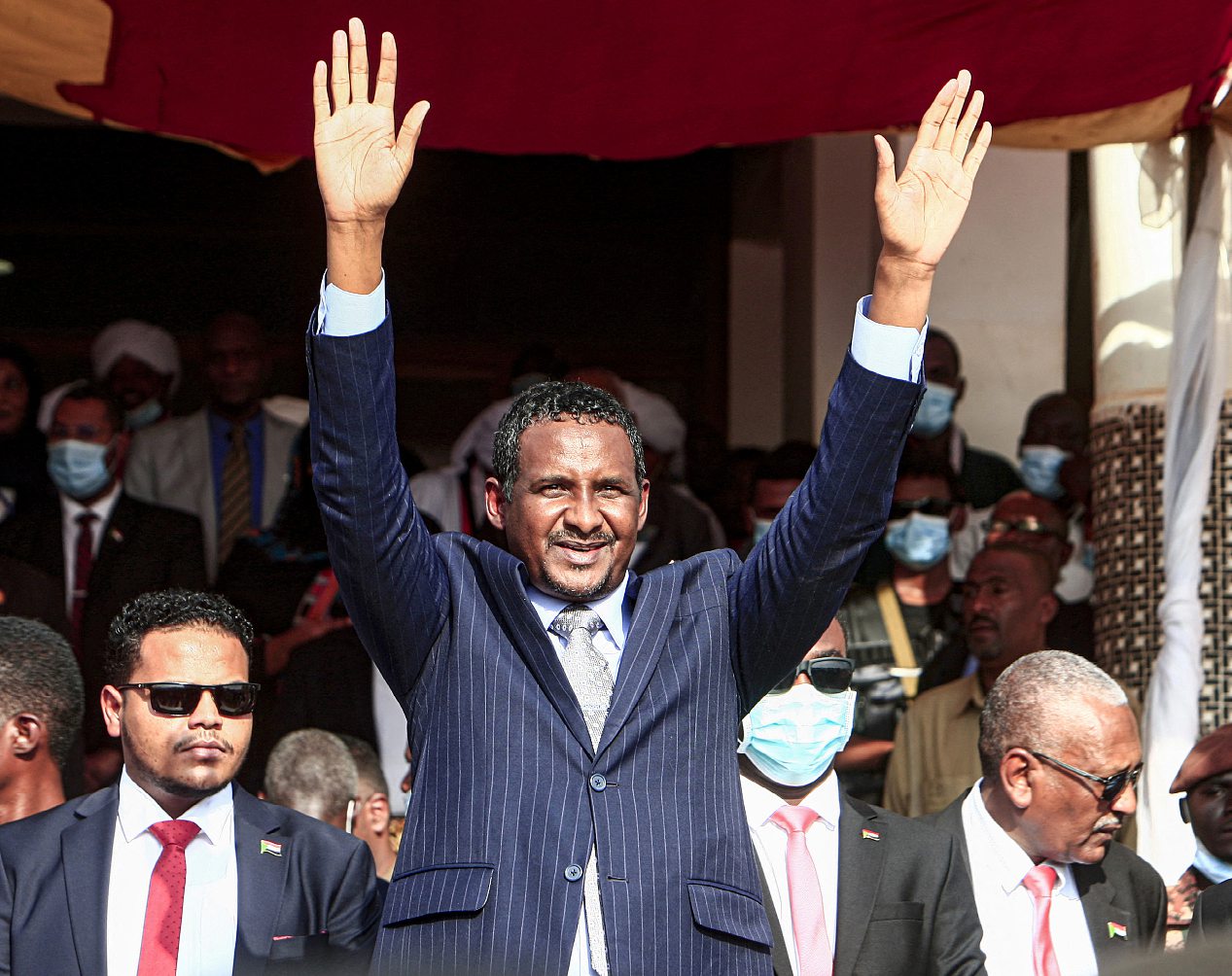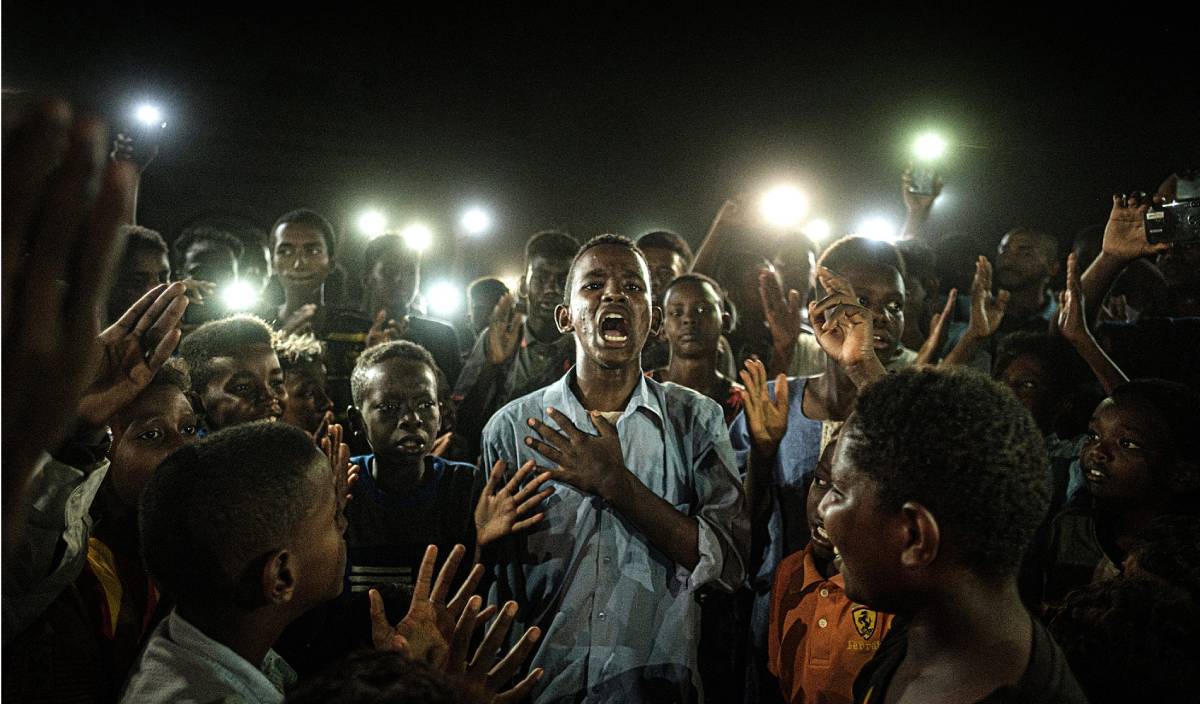
Sudan
an african tragedy
The « war of the generals » is entering its third year, with no hope of peace in sight. The country is ravaged by violence and fighting. Its people are exhausted. Regional powers are playing their cards to gain strategic control over wealth. And the continent remains powerless in the face of disaster.

Nothing and no-one seems able to halt Sudan's descent into hell. The third largest country on the continent (nearly 2 million km² ), with a population of 44 million, is entering its third year of conflict. The ‘war of the generals’, which began on 15 April 2023, has left 150,000 people dead and 14 million displaced, while the United Nations warns that famine threatens at least half the population. In a report published on 10 April, Amnesty International condemned the “atrocious and widespread use of sexual violence by the Rapid Support Forces” (RSF), Hemedti's paramilitaries. The African Union (AU) describes the situation as “the worst humanitarian crisis in the world”, and deplores the “ongoing war crimes and crimes against humanity”, while its repeated calls for an “end to the fighting” and for “inter-Sudanese political dialogue” ring hollow. On 24 April, the World Health Organisation (WHO) announced the destruction of a medical research centre in Khartoum, the only one of its kind in the world, which had been working since 1991 to combat mycetoma, a neglected tropical infection affecting farmers and shepherds. “We have lost all the contents of our biological banks, it's hard to bear,” its director, Ahmed Fahal, told Agence France-Presse (AFP). “Sudan is taking a big step backwards.” The national museum, located in the capital and containing around a hundred thousand Nubian archaeological objects, was also completely ransacked. “The tragedy is immense and most of the museum's rare objects, as well as its gold and precious stones, have been lost,” announced its curator. The thieves left behind only a few ancient statues – too heavy to be stolen – as silent witnesses to human depravity.

These crimes against science and the national heritage are symptomatic of a depoliticised conflict, mainly motivated by the irreconcilable ambitions of two ‘warlords’, two power-hungry warlords, former accomplices who became rivals and then enemies when it came to dividing up the ‘spoils’: Sudan's resources. General Abdel-Fattah al-Burhan (64), head of the Sudanese Armed Forces (SAF) and Mohammed Hamdan Daglo, known as Hemedti (51), head of the paramilitary RSF, had long been doing the dirty work of deposed head of state Omar al-Bashir (1989-2019) before overthrowing him, then joining forces in 2021 to crush the nascent Sudanese popular revolution. Like the Assad clan in Syria (1971-2024), Omar al-Bashir's regime had multiplied the number of rival security agencies, so that they could spy on each other and thwart any attempts at a coup. In 2013, Al-Bashir formalised the Janjaweed militias, which had been sowing terror for a decade in Darfur, by transforming them into a paramilitary corps, the Rapid Support Forces (RSF). Their leader, nicknamed Hemedti (Little Mohamed), is a former camel driver whose manner of speaking is eagerly mocked by the capital's educated classes. Like Al-Burhan, Hemedti benefited from the largesse of the regime, which had the economy under control. But from the end of 2018, a succession of popular protests against rising prices threatened to sweep away the ageing and sclerotic regime. Al-Burhan and Hemedti then realised that in order to keep their privileges, they would have to betray their mentor, then pretend to change everything so that nothing really changed. On 11 April 2019, a Transitional Military Council overthrew Omar al-Bashir. Headed by General Al-Burhan.
REVIVING OLD DEMONS

The fall of the despised president caused jubilation among the Sudanese people, who had never really been swayed by the imposition of Sharia law. Forced into silence for decades, old political and trade union activists came out of the woodwork and passed on their passion for debate to the enthusiastic younger generation. For a few weeks, everything seemed possible. But on 3 June in Khartoum, a demonstration was bloodily crushed by the RSF - killing at least 127 people. After just a few weeks of euphoria and hope – the whole world had been moved by videos of young people singing and dancing in the squares of Khartoum – the Sudanese saw the old demons rising up again: since independence in 1956, Sudan has experienced 17 coups d'état (a record in Africa), two civil wars between North and South (1955-1972 and 1983-2005), the negotiated partition of South Sudan in 2011 (see box), a civil war in Darfur (2003-2020) and three decades of a military-Islamist regime that isolated it diplomatically – accused of serving as a rear base for Osama bin Laden, the country was even bombed by the USA in 1998! On 17 August 2019, a Sovereignty Council made up of military personnel and civilians was put in place for a period of thirty-nine months. A transitional period at the end of which, the Sudanese still hope, democratic institutions and free elections should emerge. But this was without taking into account the determination of General Al-Burhan, military president of the Council, and his ally of circumstance, Hemedti, to cling to power by any means necessary. On 25 October 2021, the two accomplices carried out a coup. A year and a half later, on 15 April 2023, on the pretext of the RSF's refusal to merge with the regular army, they fought each other.
Long indifferent, the international community finally gathered in London on 15 April, on the second anniversary of the conflict, under the aegis of the British and French governments. However, like the African Union (AU) and the East African intergovernmental organisation (IGAD), the London meeting could only acknowledge its powerlessness. Worse still, Sudan's Foreign Minister Ali Youssef protested against the participation of the United Arab Emirates (UAE), Chad and Kenya, which he accuses of supporting Hemedti. Like two crocodiles squabbling in the same swamp, the ill-fated Al-Burhan/Hemedti duo is motivated solely by a thirst for power: compromise is out of the question. The conflict even seems to be spreading: on 4 May, for the first time, drones launched by the RSF reached the coastal city of Port Sudan, the country's provisional capital since May 2023.
While continuing to strive to expand their troops and arsenal, the two warlords are laboriously attempting, each on their own, to craft a semblance of democratic legitimacy by pretending to court civil society leaders whom they have spent their lives repressing. Meeting in Nairobi in February, representatives of the RSF and a coalition of armed groups and political movements signed a ‘founding charter’ to form a parallel government in the south-west of the country called Tasees (Foundation). The signatories pledged to ‘build a secular, democratic, decentralised state based on freedom, equality and justice’, without ‘cultural, ethnic, religious or regional bias’. The RSF's second-in-command, Abdel Rahim Daglo, Hemedti's brother, was present in Nairobi. So was Abdelaziz Al-Hilu, leader of the Sudanese People's Liberation Movement-North (SPLM-N), an armed group operating in the states of Kordofan and Blue Nile. A representative of the Sudanese trade unions, Alaa El-Din Nuqd, is also among the signatories, as is Najm Al-Din Drisa, spokesperson for an opposition movement, the United Civil Forces. Al-Burhan's government immediately recalled its ambassador to Nairobi, accusing Kenyan President William Ruto of acting in accordance with ‘his commercial and personal ties to regional sponsors’ of the RSF, an allusion to the United Arab Emirates (UAE), the main supporter of the paramilitary group.
THE POPULATION CAUGHT UP IN THE CONFLICT
The AU, citing a ‘huge risk of partition’ of the country, urged its member states not to recognise this parallel government. ‘We proudly affirm the establishment of a government of peace and unity’ that represents ‘the true face of Sudan,’ Hemedti insisted on his Telegram account on 15 April 2025, the day that marked the grim second anniversary of the start of hostilities. The paramilitary leader even promised the introduction of a ‘new currency’ and a ‘new identity card’. However, these declarations of intent praising ‘peace’, “democracy” and ‘impartiality’ seem completely unrealistic, given the widespread abuses committed by the RSF: coming from the Janjaweed militias, which terrorised Darfur in the 2000s, the paramilitaries are carrying out ethnic massacres, targeting black Sudanese in particular. At the beginning of the conflict, Hemedti had certainly tried to rally the outlying areas of Sudan, historically despised by the predatory elites in the capital, Khartoum. But the RSF are now seen as the instrument of a certain Sudanese Arab supremacism. While their leaders spoke of ‘democracy’ in Nairobi, the RSF harassed displaced persons in the Zamzam camp, opening fire indiscriminately on civilians, killing several hundred and forcing the survivors to flee once again. The presence in Nairobi of Abdelaziz Al-Hilu, a 70-year-old warlord, ‘surprised and angered many of his supporters, who had suffered direct attacks and deprivation at the hands of the RSF,’ Cameron Hudson, an analyst at the Centre for Strategic and International Studies (CSIS), told AFP. With Hilu's troops present in the states of South Kordofan and Blue Nile, their rallying could enable the RSF, which controls almost all of Darfur, to improve its access to the borders with Chad, Libya, the Central African Republic (CAR), South Sudan, Ethiopia, and beyond to Kenya and Uganda, countries where the authorities are generally favourable to them. French researcher Marc Lavergne, emeritus research director at the CNRS and an expert on Sudan, believes that the civilian opponents who appeared alongside the RSF in Nairobi are “people from Khartoum who do not want the Islamists to return and who see Hemedti as a bulwark against the Islamists”. But given the scale of the abuses committed by the RSF, “this is a risky and morally questionable calculation,” he told Afrique Magazine.
However, the abuses committed by the paramilitaries mirror those committed by the military. With control of the skies, the Sudanese air force bombs RSF-controlled areas, without any consideration for the civilian population. On 26 March, General Al-Burhan announced the ‘liberation’ of Khartoum after two years of RSF occupation. According to reports from journalists on the ground, the arrival of the regular army was a relief for many of the capital's inhabitants, who had had enough of the looting, abductions and rapes perpetrated by the paramilitaries. Thanks to their ability to move very quickly in columns of all-terrain vehicles, the RSF “takes towns by surprise and then loots them”, explains Marc Lavergne. But then they prove “incapable of administering and holding them over the long term. They have no popular support. In Khartoum, the middle classes and workers don't want to be governed by camel drivers”.
AN INTERNATIONAL GAME OF ALLIANCES
On 3 April, the United Nations High Commissioner for Human Rights, Volker Türk, nevertheless announced “credible reports of numerous cases of summary executions of civilians” suspected by the Sudanese Armed Forces of having collaborated with the RSF. From Port Sudan, General Al-Burhan had expressed in early February his “intention to establish a war government or an interim government in order to complete the transitional tasks and assist the army in the remaining military operations to cleanse Sudan of the RSF”. The SAF is supported by Islamists – much to the dismay of secular Sudanese – but also by figures from the political and military opposition to Omar al-Bashir's regime, such as Malik Agar, a former rebel who has become the army's number two, and Abdel Wahid El-Nour, one of the initiators of the Darfur uprising in 2002. With this ad hoc coalition, called Somoud (Resilience), Al-Burhan is trying to win the support of pro-democracy figures, while retaining the backing of the Islamists, nostalgic for Omar al-Bashir's regime and its sharia law.
At the same time, each of the protagonists is cultivating external support and sources of funding to pay their troops, and is working to win over - or change the allegiance of - the multitude of armed groups that abound in this complex country, where AK-47s are easily accessible. During the civil war in Yemen, Hemedti sent the RSF to fight the Iranian-backed Houthi rebels alongside the Emiratis and the Saudis. The President of the Emirates, Mohammed ben Zayed Al Nahyane, known as ‘MBZ’, has not forgotten this: despite paying lip service to the fact, MBZ is indeed Hemedti's main supporter. Sudanese gold, extracted from mines in Darfur – a region controlled by the RSF – is exported to the Emirates for refining... and returned as arms. The Emirates also hope to benefit from the agricultural land controlled by the RSF. MBZ sees it as “just a business”, says Marc Lavergne. Sudan's soil and subsoil are “perceived as mere resources”. According to a report by the Sudan Conflict Observatory published on 14 October, Emirati arms deliveries to the RSF are channelled through Mahamat Idriss Déby's Chad, which is close to the Gulf monarchy and which recently granted the RSF a $500 million loan. However, N'Djamena's support for the RSF is causing some tension within the Chadian army: officers from the Zaghawa ethnic group are not happy that their country is supporting a movement that commits acts of violence against the Zaghawa in Sudan. Marc Lavergne sums up: “The RSF have the interested support of all the countries bordering Sudan, apart from Egypt. They have colossal resources, provided by Dubai in exchange for Sudanese gold.” The paramilitaries also benefit from the support of Wagner's Russian mercenaries (well established in CAR) to secure the gold mines in Darfur. There is also evidence of the presence of hundreds of mercenaries from faraway Colombia around the town of El-Fasher, in Darfur, which is under siege by the RSF! Some survivors, interviewed by the Colombian media, swear they were deceived: recruited on the pretext of securing oil installations in the Gulf, they landed in Libya before being sent against their will to the Sudanese front, alongside the RSF.
On the other hand, General Al-Burhan's regime is diplomatically supported by Saudi Arabia, a rival of the Emirates. The SAF receives help from Iran, which delivers arms to Port Sudan airport, according to a very precise report by the Sudan Conflict Observatory, which even gives the aircraft's registration number. The support of the Islamic Republic of Iran, which is very isolated diplomatically, for Al-Burhan is quite logical: attracting Sudan's good graces would give it a foothold on either side of the Red Sea (its Houthi allies are already in control in Yemen). General Al-Burhan also enjoys the support of Turkey and Egypt, with whom he has long-standing ties: many SAF officers were trained at Egyptian military schools. Qatar, eternal rival of the Emirates and supporter of the Muslim Brotherhood, has financed the Sudanese air force's purchase of Russian and Chinese aircraft. Ukraine has also confirmed that it has sent a number of military instructors to work alongside the SAF... with the sole aim of undermining Wagner's Russians! However, the Kremlin has recently moved closer to Al-Burhan, while Cairo is reportedly questioning its support for the SAF, due to pressure from its Emirati creditor, which supports the RSF and is increasing its investments in Egypt.
The complexity of the interests at stake, their interweaving, their ramifications and their constant changes, make it highly unlikely that hostilities will cease any time soon. The personal conflict between two unscrupulous warlords, complicit gravediggers in the burial of the democratic revolution of 2019, has thus degenerated into a globalised civil war and transformed Sudan into a vast and bloody chessboard. An inextricable geopolitical terrain covering 2 million square kilometres where a myriad of interests clash, from local quarrels between herders and farmers to the Russian-Ukrainian conflict and rivalries between Gulf powers. All under the impotent eyes of the international community and to the detriment of the Sudanese people as a whole!
TOWARDS A BITTER END?
Less than fifteen years after the secession of South Sudan, is Africa about to witness a second partition of the country, this time between the South-West, controlled by Hemedti, and the North-East, controlled by Al-Burhan? This scenario is envisaged by many observers, given the resources and foreign support of the two warring parties. After all, Libya has for years been administered by two governments, that of ‘national unity’ in Tripoli and that of Marshal Khalifa Haftar in Benghazi. “What we are witnessing at the moment is the emergence of a form of de facto partition of the areas controlled by the belligerents,” confirms Ahmed Soliman, a specialist in the Horn of Africa at the geopolitical think tank Chatham House, on X (ex-Twitter). “The Sudanese civil war is both too local and too international to be settled by a diplomatic process focusing on its two warring parties, who have only limited control over the militias they have enlisted,” analyses Joshua Craze, a researcher at the London School of Economics (LSE) and a leading expert on Sudan, in an article published on 17 April by the British magazine The New Left Review (Sudan's World War). Craze talks about a “disjointed country controlled by external interests and fragmented by local dynamics... The forces tearing Sudan apart have little interest in ending this war, which has created a kind of enclave capitalism”. A victory for the army could, however, put an end to the scenario of a de facto partition of the country. The RSF, battle-hardened by their experience in Darfur and Yemen, certainly dominated the first year of the conflict, easily capturing, for example, Wad Madani, capital of the state of Al Jazira, and Sinja, in the state of Sennar. But since last October, the SAF has been regaining ground, retaking Wad Madani in January (thanks to the defection of an RSF leader, Abu Aqla Kikal), then Khartoum in March. “The tide has turned,” says Marc Lavergne. “The army has more trump cards up its sleeve: its air force, its logistical capabilities and also its chain of command. In the long run, I think it will prevail.” This victory will hardly change the daily lives of the Sudanese people. As a popular Pakistani saying goes, ‘every country has an army, but some armies have countries’. Unfortunately, this is the case in Sudan: “The Sudanese army is predatory and has ruled the country almost without interruption since independence,” points out Marc Lavergne. With the secession of South Sudan in 2011, “the army lost its oil resources, so it is seeking to recover its gold resources, de facto controlled by Hemedti”. Even if Al-Burhan wins, everything will still have to be done, and the Sudanese people will have to complete the democratic revolution begun during the popular uprising of 2018-2019. This is not only desirable, but possible. The specialist points out that “the army knows how to run the country, but it knows neither how to develop it nor how to respond to the aspirations of the young people who led the 2019 revolution. With political parties, some fifty religious brotherhoods and tribal chiefs, civil society, at least in central Sudan, is politically ready for democracy”.